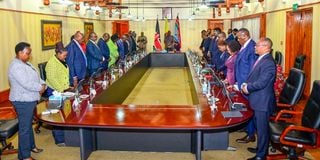Why Kenya’s political polling emits more heat than light

President William Ruto with his Cabinet Secretaries during a Cabinet meeting at Sagana State Lodge, Nyeri County.
What you need to know:
- In recent years, polls conducted to gauge the popularity of a sitting government have elicited exact sentiments.
- The situation flares up to fever pitch when polls present a schedule showing who outdid whom among, say, cabinet colleagues.
It is a week since the Kenya Kwanza administration commemorated its first year in office. But as the rank and file of Kenya Kwanza’s top performers rejoiced, their counterparts adjudged ne’er-do-wells by one of the pollsters joined an orgy of teeth-gnashing, part of it virulently expressed by a legion of rabid online minions mudslingers.
Granted, political polling during electioneering periods evokes undue hoo-ha, particularly when ratings seem to favour one of the contesting parties. In recent years, polls conducted to gauge the popularity of a sitting government have elicited exact sentiments. The situation flares up to fever pitch when polls present a schedule showing who outdid whom among, say, cabinet colleagues.
Supposedly, opinion pollsters tag their ranking to public opinion. Therefore, their ranking is gleaned from views from the public and not the whims of the gatherers, collators or analysts of the data.
Science of polling
So, when Infotrak presented its analysis on the performance of Kenya Kwanza’s first cabinet, virulent online backlash ensued. Expressions of doubt, disapproval and outright dismissal of the credibility of Infotrak’s performance ranking among cabinet secretaries morphed into a wild social media brouhaha.
The discontent expressed posed several questions. Why that scepticism? How many Kenyans, really, understand the science of polling? If visibility—be it for its own sake—is the approved measure of good performance, who, then, are we to deny Kenyans their say?
And, moving forward, to what extent does the pollster suffer bad publicity at the altar of accusations borne, most likely, of ignorance? Are these polls really necessary? Clearly, there are more questions than answers on this matter.
Whatever Kenyans make of our political polling culture, time has come for us to approach them with a generous serving of salt and for good reasons.
Performance targets
First, in terms of opportunities for publicity, do all ministries have equal chances of making similar impressions on the public mind? I don’t think so. There are ministries that, by dint of their mandate, are obligated to be in the limelight more than others.
Besides, must ‘not being seen’ — whatever that means — automatically translate to poor performance to the general public? For example, when global crude oil prices soar and the local pump price skyrockets, should the minister in charge of the related docket become public enemy number one?
Secondly, how much information on the mandates of cabinet dockets is known to the general public as to make them competent judges of scales of performance? Perhaps, we need a simplified way of enlightening the public about the performance targets of each CS before we open the door for skewed opinions to usher unhinged condemnation of public servants based on mere fallacy.
The bigger concern, however, is about how much good—if any at all—political polls portend for Kenya when there’s hardly a shared reference point between randomly picked informants of pollsters’ and the consumers of poll results.
Mr Omamba is the MCA for North Kanyamkago Ward, Uriri Constituency, Migori County. [email protected]





